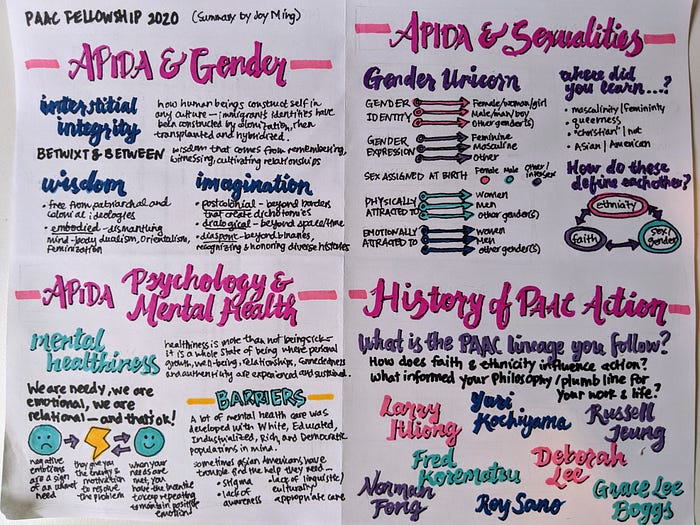The PAAC fellowship was an absolutely amazing experience — it really transformed my understanding of myself as a Progressive, Asian American, and Christian and how I relate to my community and the world.
Here’s a small piece of the awesome content that we covered!

PAAC FELLOWSHIP 2020 (summary by Joy Ming)
APIDA Histories
- Orientalism (before Asians in US, seen as weak, inferior, submissive, feminine)
- Anti Asianist (separation, exclusion, expulsion — don’t belong, wont “give up on their foreignness”)
- Liberal (“defend” democracy, speak for Asians, “just as American as the rest of us”)
- Asian American (focus on community experience, parallel to black power, inclusive of more ethnicities, read & document history)
APIDA Theologies
- Race as translocal (“sojourners,” “nomadic morality,” “not being at home in one’s home,” “interstitial integrity” — search for balance and harmony in the midst of multiplicity, “liminal spaces” — the “in-betweens”)
- Sensitivity to pathos (dissonance and dissent that is both subversive and constructive, alignment with other marginalized peoples, intersections to gender and sexuality)
- Amphibolous faith (caught between Christianity and culture, hybridity and heterogeneity, interreligious dialogue)
Faith & Political Action
- Augustine (Heavenly vs. Earthly cities, Earthly city is temporary but provides important goods ie. food, responsibility to serve as a way of serving Heavenly city & eternal peace)
- Niebuhr (was a pacifist but found that idealists not doing anything in the face of true evil is irresponsible, do what can to achieve perfect justice but accept limitations)
- Hauerwas (communities are centered around stories and the church has a different one, illustrate a new way of life even if it doesn’t make sense to everyone)
- Liberation (all theology is contextual and thus far we have been missing voices, sin is personal and structural, faith as praxis, Love of God is love of poor neighbor, need to liberate poor like Good liberated the slaves)
APIDA & Races
- “Bloody hierloom of whiteness” : The US was founded on the idea of the racial binary and “racism remains at the heart of this country’s political life.”
- “Asian Americans are the loneliest Americans,” as their place on the racial binary is unclear, often not having a clear “stake in the national conversation.”
- What if we stepped outside racial binaries? The current hierarchies for gender and race are no longer appropriate. We can move beyond contextual assumptions about physical features, ancestry, and geographical origins to define “race”

APIDA & Gender
- Interstitial integrity : how human beings construct self in any culture — immigrants identities have been constructed by colonization, then transplanted and hybridized.
- Betwixt & between : wisdom that comes from remembering, witnessing, cultivating relationships
- Wisdom (free from patriarchal and colonial ideologies, embodied — dismantling mind-body dualism, Orientalism, feminization)
- Imagination (postcolonial — beyond borders that create dichotomies, dialogical — beyond space/time, diasporic — beyond binaries, recognizing & honoring diverse histories)
APIDA & Sexualities
- Gender unicorn : gender identity (female/woman/girl, male/man/boy, other genders), gender expression (feminine, masculine, other), sex assigned at birth (female, male, other/intersex), physically attracted to (women, men, other genders), emotionally attracted to (women, men, other genders)
- Where did you learn…? masculinity|feminity, queerness, “Christian”|not, Asian|American
- How do these define each other? ethnicity, sex/gender, faith
APIDA Psychology & Mental Health
- Mental healthiness : healthiness is more than not being sick — it is a whole state of being where personal growth, well-being, relationships, connectedness, and authenticity are experienced and sustained
- We are needy, we are emotional, we are relational — and that’s ok!
- Negative emotions are a sign of an unmet need →they give you the energy & motivation to resolve the problem → when your needs are met, you have the incentive to keep repeating to maintain positive emotions
- Barriers: A lot of mental health care was developed with White, Educated, Industrialized, Rich, and Democratic populations in mind. Sometimes Asian Americans have trouble finding the help they need… (stigma, lack of awareness, lack of linguistic/culturally appropriate care)
History of PAAC Action
What is the PAAC lineage you follow?
How does faith & ethnicity influence action? What informed your philosophy/plumb line for your work & life?
- Larry Itliong
- Yuri Kochiyama
- Russell Jeung
- Fred Korematsu
- Deborah Lee
- Norman Fong
- Roy Sano
- Grace Lee Boggs










